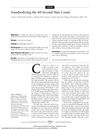 1 citations,
July 2016 in “Cosmetics”
1 citations,
July 2016 in “Cosmetics” Black henna tattoos can cause severe allergies to hair and textile dyes, and there's a need for greater public awareness and regulation.
 September 2022 in “bioRxiv (Cold Spring Harbor Laboratory)”
September 2022 in “bioRxiv (Cold Spring Harbor Laboratory)” A new staining method shows a special area in the hair's skin layer with lots of proteoglycans.
 September 2022 in “Research Square (Research Square)”
September 2022 in “Research Square (Research Square)” Increasing Rps14 helps grow more inner ear cells and repair hearing cells in baby mice.
 January 2018 in “International journal of food and nutrition research”
January 2018 in “International journal of food and nutrition research” Intermittent iron and nutritional supplements can help reduce hair loss.
 January 2012 in “Elsevier eBooks”
January 2012 in “Elsevier eBooks” Hair loss can cause emotional and social issues, and various treatments, including medication, surgery, and psychological support, are needed.
 January 2006 in “The Journal of Korean Medicine Ophthalmology and Otolaryngology and Dermatology”
January 2006 in “The Journal of Korean Medicine Ophthalmology and Otolaryngology and Dermatology” Rubus coreanum may help hair growth but not through the tested mechanisms, and none of the herbal extracts help with acne.
 June 2004 in “Dermatologic Surgery”
June 2004 in “Dermatologic Surgery” The single-scar technique in hair transplantation minimizes scarring and preserves hairs for future use, with proper training overcoming its perceived drawbacks.
 208 citations,
December 2003 in “Journal of Investigative Dermatology”
208 citations,
December 2003 in “Journal of Investigative Dermatology” Certain cells from hair follicles can create new hair and contribute to hair growth when implanted in mice.
 68 citations,
May 2018 in “PLOS Biology”
68 citations,
May 2018 in “PLOS Biology” Cyclosporine A may help treat hair loss by blocking a protein that inhibits hair growth.
 22 citations,
April 2006 in “Journal of The American Academy of Dermatology”
22 citations,
April 2006 in “Journal of The American Academy of Dermatology” More research is needed to determine if iron deficiency causes hair loss.
 18 citations,
June 2008 in “Archives of Dermatology”
18 citations,
June 2008 in “Archives of Dermatology” Men typically shed about 10 hairs in 60 seconds, and this amount doesn't increase with age.
 10 citations,
May 2015 in “International Journal of Women's Dermatology”
10 citations,
May 2015 in “International Journal of Women's Dermatology” New treatments for skin and hair disorders in women of color address unique biological differences and include specific acne medications, sunscreens, skin lighteners, and hair care adjustments.

Dermal stem cells help regenerate hair follicles and heal skin wounds.
 68 citations,
August 2014 in “Stem Cells Translational Medicine”
68 citations,
August 2014 in “Stem Cells Translational Medicine” Dermal papilla cells help wounds heal better and can potentially grow new hair.
 67 citations,
August 2013 in “International Journal of Cosmetic Science”
67 citations,
August 2013 in “International Journal of Cosmetic Science” Hair greying is caused by oxidative stress damaging hair follicles and melanocytes.
 19 citations,
August 1993 in “Journal of Cutaneous Pathology”
19 citations,
August 1993 in “Journal of Cutaneous Pathology” Alopecia causes smaller hair follicles and affects growth-related structures.
 8 citations,
October 2017 in “Dermatology practical & conceptual”
8 citations,
October 2017 in “Dermatology practical & conceptual” A spermidine-based supplement may help hair grow longer by keeping it in the growth phase.
 4 citations,
October 2002 in “BJUI”
4 citations,
October 2002 in “BJUI” Finasteride treats hair loss but may affect prostate cancer detection.
 July 2024 in “Biological and Pharmaceutical Bulletin”
July 2024 in “Biological and Pharmaceutical Bulletin” Licorice extract helps hair growth and may treat hair loss.
 31 citations,
May 2012 in “European Journal of Dermatology”
31 citations,
May 2012 in “European Journal of Dermatology” Menopause affects hair and skin; more research needed for treatment.
 June 2024 in “Al- Anbar Medical Journal”
June 2024 in “Al- Anbar Medical Journal” Acute telogen effluvium can be resolved by addressing causes, but chronic telogen effluvium is harder to treat.

Stress significantly contributes to hair loss, especially in women and those aged 31-40.
 5 citations,
June 2019 in “Dermatopathology”
5 citations,
June 2019 in “Dermatopathology” Histopathology is not reliable for detecting early fibrosis in traction alopecia or for showing how severe it is.

Women with female pattern hair loss may have a higher risk of metabolic syndrome.
 December 2014 in “Research and Reviews: Journal of Pharmacology and Toxicological Studies”
December 2014 in “Research and Reviews: Journal of Pharmacology and Toxicological Studies” Cabbage extract in hair gel may promote hair growth and could help treat hair loss.
 1 citations,
February 1994 in “Drug Investigation”
1 citations,
February 1994 in “Drug Investigation” Sulfasalazine might cause hair loss, especially in women, and stopping it can reverse the hair loss.
 3 citations,
October 1993 in “The Journal of Dermatology”
3 citations,
October 1993 in “The Journal of Dermatology” The review suggests limited treatments for common hair loss conditions, with potential for future improvements.
 1 citations,
November 2011 in “Open access journal of contraception”
1 citations,
November 2011 in “Open access journal of contraception” Birth control pills with low-dose estrogen and antiandrogenic progestins can effectively treat acne.
 12 citations,
August 2013 in “Facial Plastic Surgery Clinics of North America”
12 citations,
August 2013 in “Facial Plastic Surgery Clinics of North America” Hair transplantation is the only permanent solution for female pattern hair loss and can greatly improve quality of life with careful planning.
 1 citations,
January 2015 in “Journal of Aesthetic & Reconstructive Surgery”
1 citations,
January 2015 in “Journal of Aesthetic & Reconstructive Surgery” Hair transplantation is the best treatment for hair loss, with new technologies improving results, and stem cell and gene therapies may treat severe baldness in the future.





























